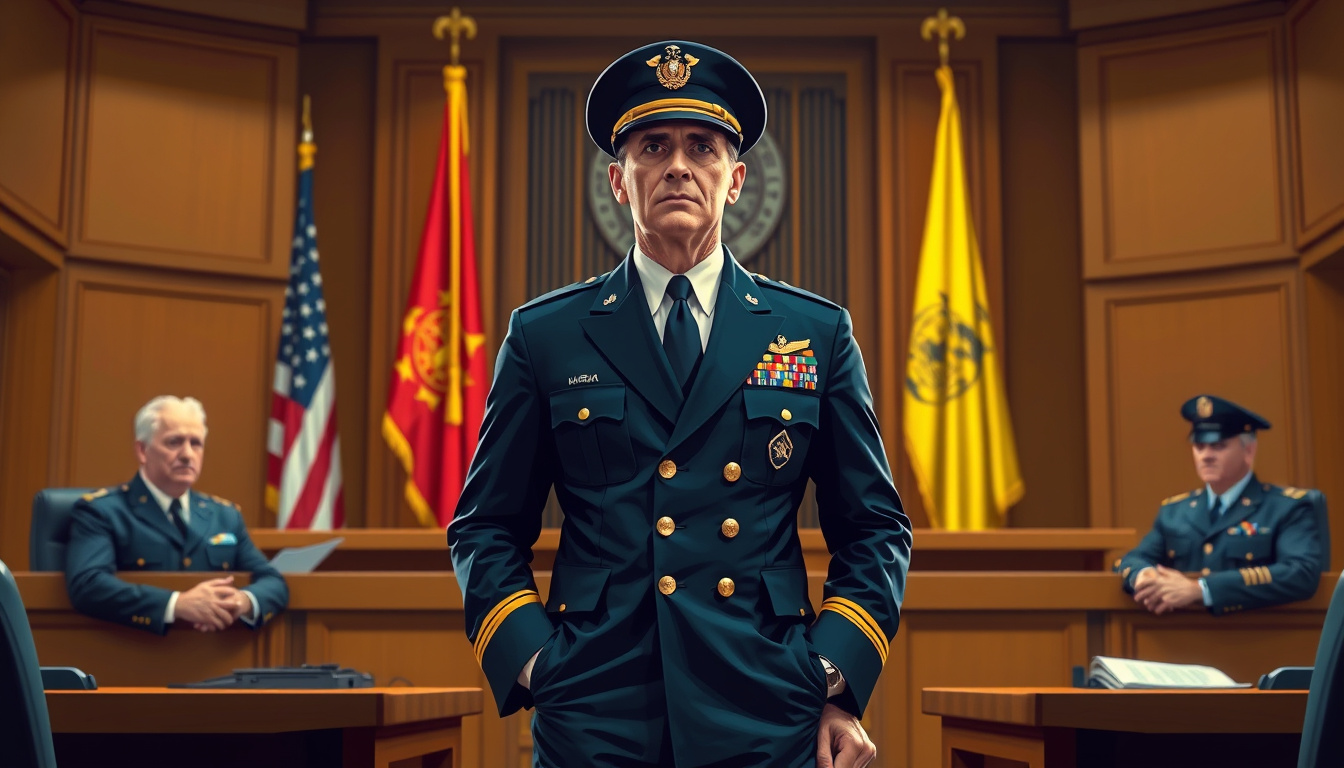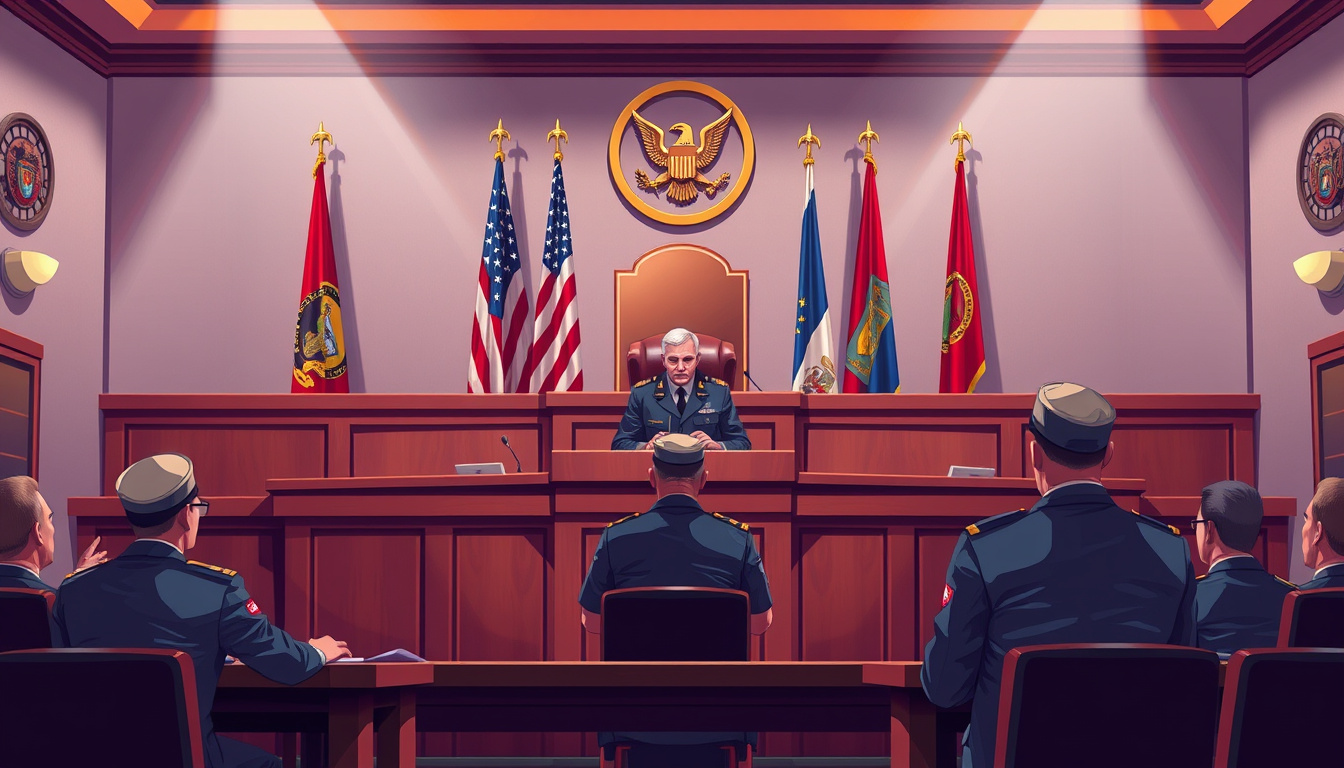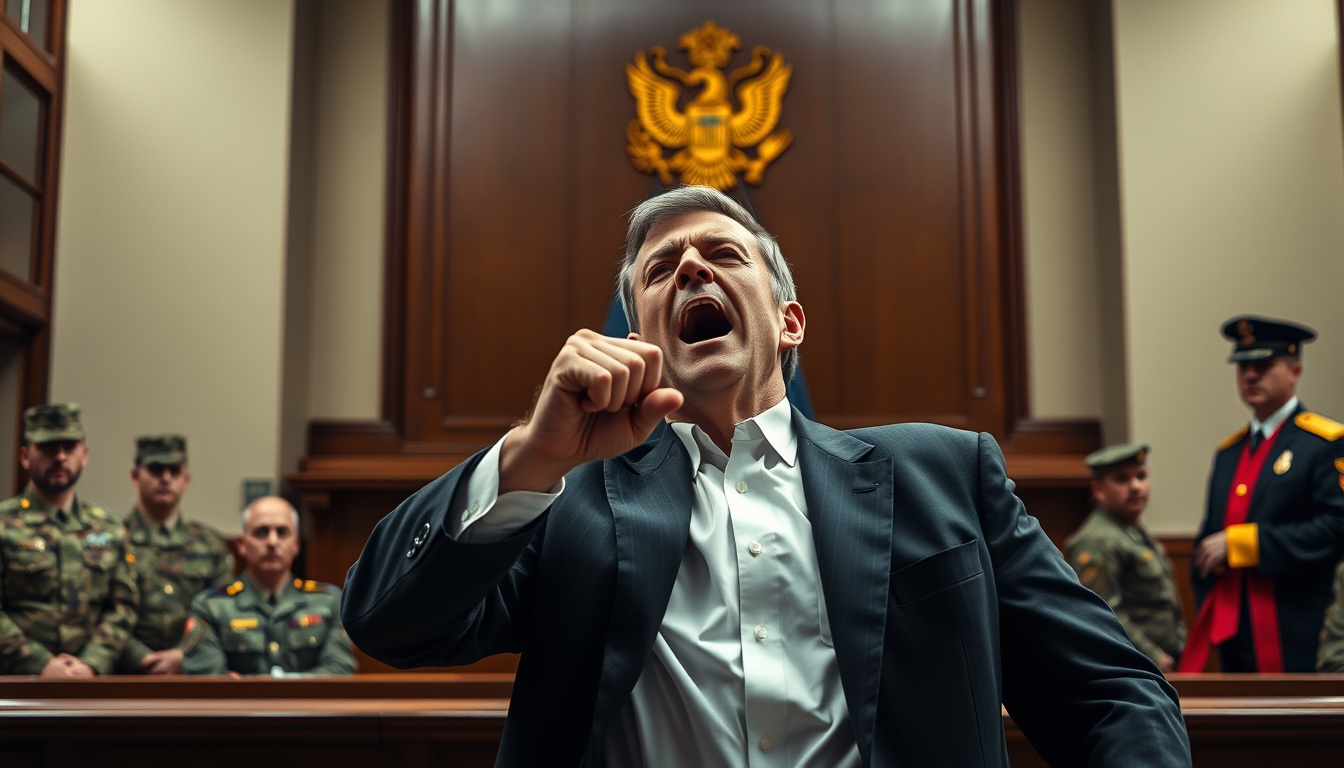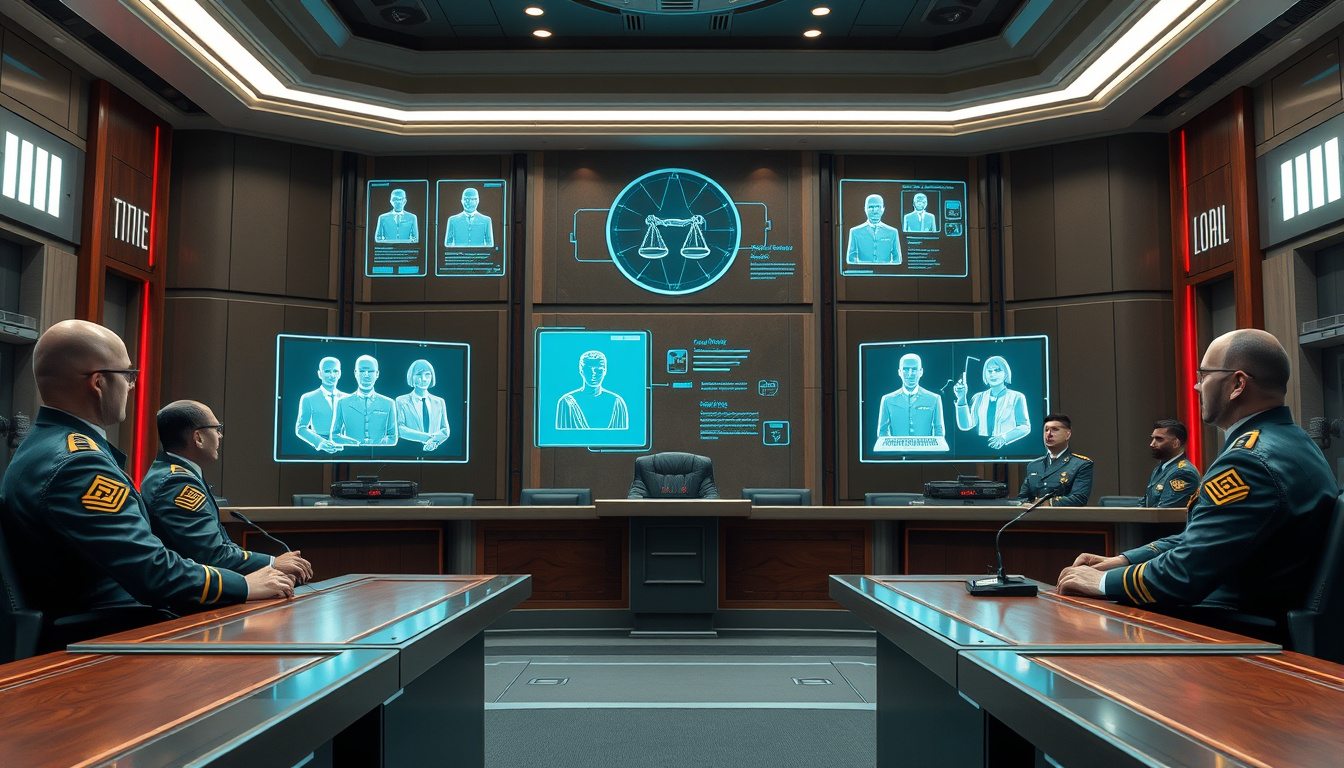Navigating the complexities of military law can be daunting, especially for servicemembers and their families who find themselves facing court martial, UCMJ violations, or administrative actions.
Understanding the role of a court martial lawyer becomes imperative in these challenging times.
This article aims to provide valuable insights into court martial law, the responsibilities held by a court martial lawyer, the types of cases they handle, the court martial process, how they defend their clients, and what the future holds for military legal proceedings.
Whether you’re serving in the military or a family member looking for guidance, this comprehensive guide will help clarify your questions and provide a pathway forward in the face of serious allegations.

Key Takeaways
- Court martial lawyers specialize in defending military personnel in military justice proceedings.
- They have various roles, including legal representation, counsel, and advocacy for the accused.
- Court martial cases encompass a range of offenses from minor violations to serious felonies.
- Understanding the court martial process is essential for effective defense strategy.
- Appeals and post-trial procedures are critical for ensuring justice in military law.
Introduction to Court Martial Law
When military servicemembers and their families confront the looming threat of a court martial, it is crucial to understand both the gravity of this legal process and the potential implications it can have on a military career and personal life.
A court martial is a judicial court for trying members of the armed services, specifically set up to handle offenses under the Uniform Code of Military Justice (UCMJ).
The very nature of military discipline means that allegations can lead to serious convictions, ranging from minor infractions to severe criminal charges.
This complex environment underscores the need for an experienced court martial lawyer, who can navigate the intricacies of military law, defend the rights of servicemembers, and ensure that every aspect of the case is thoroughly addressed.
In this article, we will delve into the specifics of court martial proceedings, the role of a court martial lawyer, and essential steps that servicemembers and their families should take when facing such allegations.
Roles and Responsibilities of a Court Martial Lawyer
When facing serious allegations that could lead to a court martial, understanding the roles and responsibilities of a court martial lawyer becomes paramount for military servicemembers and their families.
A court martial lawyer is a specialized legal professional who represents military personnel in proceedings related to the Uniform Code of Military Justice (UCMJ).
Their main responsibility is to ensure that the rights of the servicemember are protected throughout the legal process.
This includes analyzing the charges, developing a defense strategy, and advocating on behalf of their client during hearings and trials.
Moreover, court martial lawyers work to gather evidence, interview witnesses, and present compelling arguments to improve their client’s chances of a favorable outcome.
They also provide crucial advice on potential plea agreements or other legal options available, aiding clients in understanding the nuances of military law.
For families, a court martial lawyer serves as a vital resource, providing guidance and support as they navigate the complexities of military legal proceedings.
Having a knowledgeable court martial lawyer can significantly impact the trajectory of a case, making their role critical for any servicemember facing allegations under the UCMJ.
‘Justice delayed is justice denied.’ – William E. Gladstone

Types of Cases Handled in Court Martial Proceedings
When facing serious allegations in the military, having the right representation is crucial.
A court martial lawyer specializes in defending servicemembers against charges brought under the Uniform Code of Military Justice (UCMJ).
There are various types of cases that are addressed within court martial proceedings, and understanding these categories can help military personnel and their families navigate this challenging process better.
The main types of court martial include summary, special, and general courts martial, each varying in severity and process.
Summary court martial typically handles less severe offenses and includes limited due process rights.
On the other hand, special courts martial address intermediate offenses and provide more formal proceedings.
General courts martial deal with the most serious allegations, such as felonies, and involve a detailed investigation, often with more significant consequences.
Your court martial lawyer will not only help you understand which type of court martial you might be facing but will also prepare a rigorous defense tailored to the specifics of your case, ensuring you have the best chance at protecting your rights and career.
The Court Martial Process Explained
Navigating the complex military justice system can be a daunting experience for service members and their families.
Understanding the court martial process is crucial, especially if you or a loved one is facing allegations under the Uniform Code of Military Justice (UCMJ).
A court martial lawyer plays a vital role in ensuring that your rights are protected throughout this challenging experience.
In the military, court martial proceedings are classified mainly into three types: summary, special, and general courts martial, each differing in severity and the range of penalties.
Summary courts martial handle minor offenses and typically involve a single officer acting as the judge, while special courts martial can address more serious charges and include a panel of officers or enlisted members.
General courts martial, on the other hand, deal with the most severe allegations, such as felonies, and can result in life imprisonment or even a death sentence.
It’s important to recognize that each type of court martial has its own procedures, and having a knowledgeable court martial lawyer can make a significant difference in the outcome of your case.
They can help you understand the charges against you, gather evidence, and prepare a robust defense to ensure that justice is served.

Defending Clients in Military Courts
When military servicemembers and their families find themselves facing the challenging waters of a court martial, having the right representation is crucial.
A court martial lawyer serves as the essential advocate, navigating complex military laws and regulations to protect the rights of service members.
This specialized legal professional not only understands the intricacies of the Uniform Code of Military Justice (UCMJ) but also possesses an in-depth knowledge of military procedures, ensuring that those accused of crimes or facing administrative actions receive a fair trial and robust defense.
Facing allegations such as misconduct, assault, or other crimes in the military can lead to severe consequences, including potential separation from service or imprisonment.
A court martial lawyer is vital in constructing a solid defense strategy, which may involve gathering evidence, interviewing witnesses, and challenging the prosecution’s case.
It’s important to emphasize that every service member is entitled to a defense, and with the right legal counsel, the odds of a favorable outcome can significantly increase.
Furthermore, they can help alleviate the stress and confusion that comes with these proceedings, allowing servicemembers to focus on their duties while their legal issues are addressed.
In addition to defending clients in actual court martials, these attorneys can also provide guidance on administrative procedures that may lead to separation from service.
This aspect of their role is equally critical, as improper handling of administrative actions can have long-lasting impacts on a military career.
Understanding military law can be daunting, but a skilled court martial lawyer simplifies this process, helping clients understand their rights, the potential implications of the allegations, and the steps necessary to mount an effective defense.
Appeals and Post-Trial Processes
Navigating a court martial can be an overwhelming experience for military servicemembers and their families.
When facing serious allegations and the potential for severe consequences, the role of a skilled court martial lawyer becomes crucial.
Once a trial has concluded and a verdict has been reached, if the outcome is unfavorable, the appeals and post-trial processes come into play.
Understanding these steps can significantly impact the future of a servicemember’s military career and personal life.
An appeal is not merely a retrying of the case; it involves reviewing the trial proceedings for legal errors that might have affected the verdict.
A court martial lawyer will conduct a thorough review of the case, identifying any mistakes made during the trial that could serve as grounds for an appeal.
Common errors include improper admission or exclusion of evidence, juror misconduct, or ineffective assistance of counsel.
Each branch of the military has its own appellate courts, and understanding these can be complex.
For example, after a conviction in the Army, a servicemember may appeal to the U.S.
Army Court of Criminal Appeals, while the Navy has the Navy-Marine Corps Court of Criminal Appeals.
A knowledgeable court martial lawyer can provide the necessary insights into the specific appellate process relevant to your branch of service.
The timeframe for filing an appeal can be stringent; therefore, it is essential to act quickly.
Typically, a notice of appeal must be filed within a short period, often just 60 days from the date of sentencing.
An experienced court martial lawyer will be well-versed in these timelines and ensure all paperwork is filed correctly and promptly to prevent any forfeiture of rights.
Once an appeal is filed, the appellate court will review the records of the trial, including transcriptions of court proceedings and evidence presented.
This process can take several months, and if the court does find an error that warrants a new trial or a reduction in sentencing, the outcome can profoundly influence the servicemember’s future.
It’s also vital to involve a court martial lawyer who can prepare persuasive briefs and arguments to present the case effectively during the appellate process.
These legal professionals possess the skills required to highlight key points in favor of the servicemember and to cast the appropriate light on any procedural missteps that occurred during the original trial.
Finally, after completion of the appellate process, if further avenues for appeal exist within the military’s judicial system or to federal courts, a court martial lawyer will guide the servicemember through these options, ensuring that no possibility for a favorable outcome is overlooked.
Engaging a court martial lawyer who understands the intricacies of these processes is paramount for servicemembers seeking to overturn a conviction or mitigate sentencing.
Doing so not only aids in navigating the legal complexities but also provides much-needed support during such a challenging time.

Conclusion and Future of Court Martial Law
In conclusion, navigating the complexities of court martial proceedings can be daunting for military servicemembers and their families, but understanding your rights and the legal landscape is crucial.
Engaging a knowledgeable court martial lawyer can make a significant difference in effectively defending against UCMJ violations and other military criminal allegations.
As the future of court martial law continues to evolve, it is vital for servicemembers to stay informed about changes and reforms that may impact their cases.
By securing competent legal representation and being proactive in your defense strategy, you can safeguard your career and reputation within the military.
Remember, having the right court martial lawyer can empower you to face allegations with confidence, ensuring that you receive fair treatment throughout the legal process.
Frequently Asked Questions
What is a court martial lawyer?
A court martial lawyer is a legal professional who specializes in representing military personnel in court martial proceedings.
They are trained in military law and are well-versed in the unique regulations and procedures that govern military justice.
What types of cases do court martial lawyers handle?
Court martial lawyers handle a variety of cases, including but not limited to allegations of misconduct, criminal offenses, administrative actions, and appeals related to military convictions.
This can include serious charges such as assault, drug offenses, and desertion.
How does the court martial process work?
The court martial process typically begins with an investigation followed by a preliminary hearing.
If charges are substantiated, the case proceeds to trial, where evidence is presented, and a verdict is reached.
Depending on the verdict, the case may move to sentencing.
Can a service member appeal a court martial decision?
Yes, service members have the right to appeal court martial decisions.
This process involves submitting a formal appeal to a higher court, and it usually requires proving that the original trial contained legal errors or injustices.
What should I look for in a court martial lawyer?
When searching for a court martial lawyer, consider their experience in military law, their track record in court martial cases, client reviews, and their understanding of the military culture.
It’s also important to ensure they are licensed and have a good reputation in the legal community.
If you or a loved one is under investigation or facing charges under the UCMJ, don’t wait to protect your future. Contact Gonzalez & Waddington, Attorneys at Law. Our battle-tested military defense lawyers have successfully defended service members worldwide against the most serious military offenses. Call us today for a confidential consultation and put our elite military defense attorneys in your corner.



